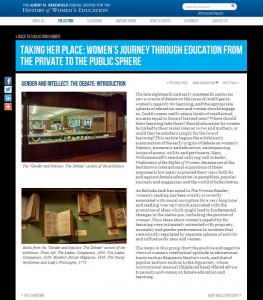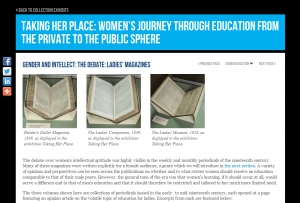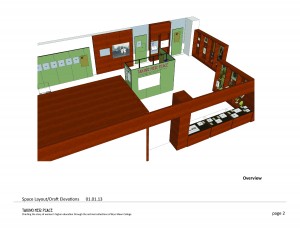Feral Feminisms, a new independent, inter-media, peer reviewed, open access online journal, invites submissions from artists, activists, scholars and graduate students for a special issue entitled, “Feminist Un/Pleasure: Reflections on Perversity, BDSM, and Desire,” guest edited by Toby Wiggins. Submitted contributions may include full-length academic essays (about 5000 – 7000 words), shorter creative pieces, cultural commentaries, or personal narratives (about 500 – 2500 words), poetry, photo-essays, short films/video (uploaded to Vimeo), visual and sound art (jpeg Max 1MB), or a combination of these. Please direct inquiries and submissions to Guest Editor, Toby Wiggins (wiggins.yorku@gmail.com).

Courtesy Co.Design, http://www.fastcodesign.com/
What gets you off? Desire is a slippery concept, difficult to hold or describe, and certainly not consistent or interchangeable. An insatiable yearning for some is for others abhorrent and deserving of reprimand. The social complexities of perversion are therefore always in flux, influencing diverse manifestations of sexuality and its censorship. According to Freud’s early formulations on the two principles of psychic functioning, and later developed in his writings on the death drive, pleasure and unpleasure are intimately bound. Our primary drive encompasses both the unpleasure of an increase in excitation and the pleasure of its release. In other words, an individual’s relationship to unencumbered indulgence continually grapples with its denial. This fundamental tension also resonates beyond psychoanalysis, in feminist genealogies, as an ambivalence towards BDSM and “perverse” sexualities. Echoed in Carole Vance’s influential anthology, Pleasure and Danger, and the ongoing battles of the sex wars, feminist sexuality encompasses both enjoyment and suffering wrapped tightly around the politics of desire. This apparent contradiction of painful enjoyment also weaves throughout BDSM sexuality itself, where the lines between violence, sex, and love begin to blur.
This special issue of Feral Feminisms aims to complicate, untame, queer and radicalize tumultuous legacies of pleasure and unpleasure by reflecting upon the current intersections of feminist desire and BDSM sexuality. Topics of inquiry may include, but are not limited to:
● pleasure and pain in feminist sexualities
● resonances of canonical sexologists such as Richard von Kraft Ebbing on contemporary perverse sexualities
● the instability of sexual subcultures vs mainstream
● gender and power play
● representations of perverse feminist sexuality in film, literature, and art
● Fifty Shades of Grey and histories of erotic fiction
● psychoanalytic theories of BDSM and/or perversion
● affect and kinky feminist desire
● sex work and professional dominatrices
● critical interrogations into the construction of subversive sexualities
● masochism, sadism, fetishism
● the politicization of BDSM
● death, the death drive, and queer sexualities
● addressing white supremacy, capitalism, ableism, colonialism, heteronormativity, and/or patriarchy through scenes of perversion
● limit experience
● BDSM sexuality as performance
Submission guidelines:
Articles, no longer than 7,000 words, should be prepared for anonymous peer-review. Please include a separate document with the contributor’s name and email, affiliated school (if applicable), a 100-word abstract, and a 60-word biography. All references should be in MLA citation style. For written submissions: 1 inch (2.54 cm) margins. Times New Roman 12pt. Double spaced. Include page number in header. Bold headings.
We also welcome the submission of shorter creative pieces, cultural commentaries, or personal narratives between 500-2500 words, poems, colour or black & white images, and films, or a combination of mediums. Written submissions should be in Microsoft Word format. Image submissions should be in jpeg, with a maximum file size of 1MB. Film submissions should be uploaded to Vimeo with a link to the film provided in the submission email; if you are submitting a film or multimedia piece and do not wish to upload to Vimeo, we are open to establishing other means of submission – please contact the Guest Editor (email provided above). All art and non-text based submissions should be accompanied by a paragraph length artist statement that outlines the goals of the work and how it engages with the CFP.
All submissions are subject to double-anonymous peer review, are reviewed by 2-3 peer reviewers, and receive collegial feedback on their work.
Previously published articles will not be considered without the permission of the editors. Do not simultaneously offer your article to another publication. The author(s) always retain copyright of their work. The author(s) may republish provided they request permission from the Managing Editors and they agree to acknowledge that it appeared in Feral Feminisms.
These submission guidelines can also be found at www.feralfeminisms.com
Email submissions to: Toby Wiggins (wiggins.yorku@gmail.com)
 The nineteenth century was an era that changed the way people experienced time on both sides of the Atlantic. New modes of transportation such as the railroad and the steam engine shortened the time spent traveling across long distances, while new forms of communication such as the telephone and the transatlantic cable promoted faster and more reliable transatlantic exchange. As time speeds up, distances shrink—enabling new opportunities and disabling old ones for both men and women. The fast tempo of factory work and groups such as the “Ten Hours Movement” fixed new importance on the relation between a man’s work and his time, while debates about “redundant women” were based on the threat posed by a large number of women who, according to Florence Nightingale, had nothing to do with their time. On the other hand, the scientific theories of Charles Darwin, Charles Lyell, Herbert Spencer, and John Fiske complicated the understanding of temporality by emphasizing the experience of “deep” geological time and “natural” evolutionary patterns.
The nineteenth century was an era that changed the way people experienced time on both sides of the Atlantic. New modes of transportation such as the railroad and the steam engine shortened the time spent traveling across long distances, while new forms of communication such as the telephone and the transatlantic cable promoted faster and more reliable transatlantic exchange. As time speeds up, distances shrink—enabling new opportunities and disabling old ones for both men and women. The fast tempo of factory work and groups such as the “Ten Hours Movement” fixed new importance on the relation between a man’s work and his time, while debates about “redundant women” were based on the threat posed by a large number of women who, according to Florence Nightingale, had nothing to do with their time. On the other hand, the scientific theories of Charles Darwin, Charles Lyell, Herbert Spencer, and John Fiske complicated the understanding of temporality by emphasizing the experience of “deep” geological time and “natural” evolutionary patterns.






